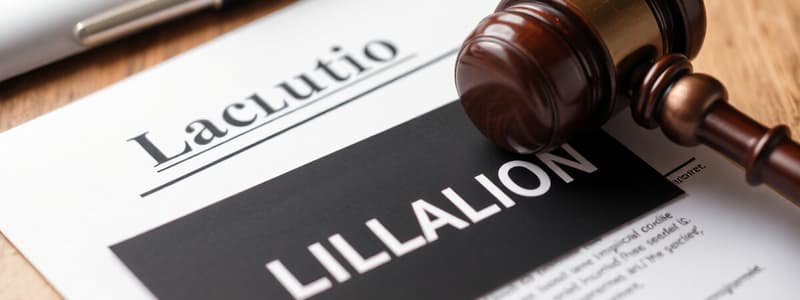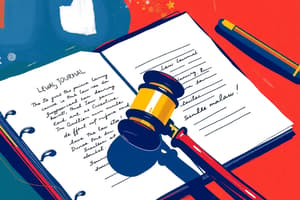Podcast
Questions and Answers
What must a party include in their written request for specific disclosure?
What must a party include in their written request for specific disclosure?
- A summary of all previous disclosures
- A description of the documents sought and why they are relevant (correct)
- The identities of all parties involved in the dispute
- The cost implications of disclosing the documents
Under what circumstance is pre-action disclosure typically available?
Under what circumstance is pre-action disclosure typically available?
- When a party begins preliminary negotiations.
- Before a lawsuit is filed in court.
- In response to a counterclaim only.
- Against a person likely to become a party to proceedings. (correct)
Which type of privilege protects communications between a client and their solicitor?
Which type of privilege protects communications between a client and their solicitor?
- Litigation Privilege
- Legal Advice Privilege (correct)
- Negotiation Privilege
- Common Interest Privilege
When can a party withhold inspection of a privileged document?
When can a party withhold inspection of a privileged document?
Which of the following is an example of Litigation Privilege?
Which of the following is an example of Litigation Privilege?
What safeguards might a party request when making a request for disclosure?
What safeguards might a party request when making a request for disclosure?
What is required of each party regarding the disclosure statement in legal proceedings?
What is required of each party regarding the disclosure statement in legal proceedings?
What is the standard timeline for parties to provide lists of documents after the issuance of an order?
What is the standard timeline for parties to provide lists of documents after the issuance of an order?
Under what circumstances can a party challenge an opponent's disclosure?
Under what circumstances can a party challenge an opponent's disclosure?
Which of the following is NOT a valid reason for limiting document disclosure?
Which of the following is NOT a valid reason for limiting document disclosure?
In non-personal injury multi-track claims, when must parties provide a disclosure report?
In non-personal injury multi-track claims, when must parties provide a disclosure report?
What must a party's disclosure statement confirm?
What must a party's disclosure statement confirm?
What must be included in a witness statement provided for trial?
What must be included in a witness statement provided for trial?
Under what condition can a party call a witness to testify if their statement was not served?
Under what condition can a party call a witness to testify if their statement was not served?
What best describes circumstantial evidence?
What best describes circumstantial evidence?
What is the role of 'Without Prejudice Privilege' in dispute resolution?
What is the role of 'Without Prejudice Privilege' in dispute resolution?
Which statement is true regarding 'Public Interest Immunity'?
Which statement is true regarding 'Public Interest Immunity'?
What must happen if a privileged document is accidentally disclosed?
What must happen if a privileged document is accidentally disclosed?
What does not need to be included in a witness summary?
What does not need to be included in a witness summary?
Which of the following statements about privileged documents is accurate?
Which of the following statements about privileged documents is accurate?
What type of documents must parties disclose according to standard directions?
What type of documents must parties disclose according to standard directions?
In fast track and personal injury multi-track cases, what is NOT a requirement for standard disclosure?
In fast track and personal injury multi-track cases, what is NOT a requirement for standard disclosure?
What is emphasized as a critical aspect of the duty of disclosure?
What is emphasized as a critical aspect of the duty of disclosure?
Which type of documents is explicitly mentioned as part of the disclosure duty?
Which type of documents is explicitly mentioned as part of the disclosure duty?
What should a claimant do in terms of their search for relevant documents?
What should a claimant do in terms of their search for relevant documents?
How does the duty of disclosure operate throughout the litigation process?
How does the duty of disclosure operate throughout the litigation process?
Which of the following is NOT included under the term 'documents' in the context of disclosure?
Which of the following is NOT included under the term 'documents' in the context of disclosure?
What must parties disclose about documents that adversely affect the other party's case?
What must parties disclose about documents that adversely affect the other party's case?
What is the key reason for extending the duty of disclosure to electronic documents?
What is the key reason for extending the duty of disclosure to electronic documents?
What is a potential consequence for parties who fail to fulfill their duty of disclosure?
What is a potential consequence for parties who fail to fulfill their duty of disclosure?
Flashcards
Requesting Disclosure
Requesting Disclosure
A party can request specific documents from another party if there is reason to believe the party did not disclose enough information.
Privilege
Privilege
Evidence that can be withheld from production and disclosure to a third party or opponent, but its existence must be disclosed.
Pre-Action Disclosure
Pre-Action Disclosure
Pre-Action Disclosure allows parties to request disclosure of evidence from each other even before formal legal proceedings begin.
Legal Advice Privilege
Legal Advice Privilege
Signup and view all the flashcards
Litigation Privilege
Litigation Privilege
Signup and view all the flashcards
Common Interest Privilege
Common Interest Privilege
Signup and view all the flashcards
Direct Evidence
Direct Evidence
Signup and view all the flashcards
Circumstantial Evidence
Circumstantial Evidence
Signup and view all the flashcards
Witness Statement
Witness Statement
Signup and view all the flashcards
Witness Summary
Witness Summary
Signup and view all the flashcards
Without Prejudice Privilege
Without Prejudice Privilege
Signup and view all the flashcards
Public Interest Immunity
Public Interest Immunity
Signup and view all the flashcards
Privilege Belongs to Client
Privilege Belongs to Client
Signup and view all the flashcards
Accidental Disclosure
Accidental Disclosure
Signup and view all the flashcards
Duty of Disclosure
Duty of Disclosure
Signup and view all the flashcards
Continuing Duty of Disclosure
Continuing Duty of Disclosure
Signup and view all the flashcards
What Counts as Disclosure
What Counts as Disclosure
Signup and view all the flashcards
Standard Disclosure in Fast Track Cases
Standard Disclosure in Fast Track Cases
Signup and view all the flashcards
Disclosing Evidence Against Your Own Case
Disclosing Evidence Against Your Own Case
Signup and view all the flashcards
Disclosure of Electronic Documents
Disclosure of Electronic Documents
Signup and view all the flashcards
Reasonable and Proportionate Search
Reasonable and Proportionate Search
Signup and view all the flashcards
Disclosure of Different Formats
Disclosure of Different Formats
Signup and view all the flashcards
Disclosure Statement
Disclosure Statement
Signup and view all the flashcards
Standard Directions
Standard Directions
Signup and view all the flashcards
Challenges to Disclosure
Challenges to Disclosure
Signup and view all the flashcards
Limited Disclosure
Limited Disclosure
Signup and view all the flashcards
Disclosure Report (Multi-Track Cases)
Disclosure Report (Multi-Track Cases)
Signup and view all the flashcards
List of Documents
List of Documents
Signup and view all the flashcards
Study Notes
Pre-Action Disclosure
- Parties are encouraged to try to agree the scope of disclosure.
- A party may make a written application for specific disclosure, but another party may disagree.
- The scope of application is similar to the request, requiring that the party believes the information is relevant.
- The party must provide a reason why they believe the information is relevant.
- A request should include the documents; and why they should be disclosed.
- The request for disclosure should be reasonable and proportionate to the extent that documents exist.
- Parties must include safeguards to protect trade secrets.
- The application can be an example for making disclosures in the court.
- Prior to proceedings, an issue is usually whether the party to whom the document belongs has the right to withhold it, and whether the party may be compelled to produce that evidence to a third party.
Legal Privilege
- This protects communications that are relevant to legal advice.
- There are four types of legal privilege.
- These relate to solicitor/client communications, communications between legal representatives and their clients, or communications between parties in a litigation context.
- A document may not be disclosed depending on whether or not the party's interest is involved in the potential litigation.
- A document that is protected by legal privilege should not be disclosed.
- If a party has disclosed a privileged document, this is a waiver of privilege, but this depends on the context.
- The relevant communications are determined based on whether the communication is part of litigation or a legal context.
- Common interest privilege- pertains to communications between multiple parties acting in a common interest.
Disclosure and Inspection
- In fast-track and personal injury cases, the standard disclosure procedure requires that each party identifies documents that they intend to use in their case.
- Documents intended to support the party's case should be identified.
- Documents that oppose the party's case should be identified.
- Documents supporting the other party's case should also be identified.
- The scope of disclosure extends to electronic documents in addition to physical documents.
- Electronic documents are reasonable and proportionate to provide.
Studying That Suits You
Use AI to generate personalized quizzes and flashcards to suit your learning preferences.




